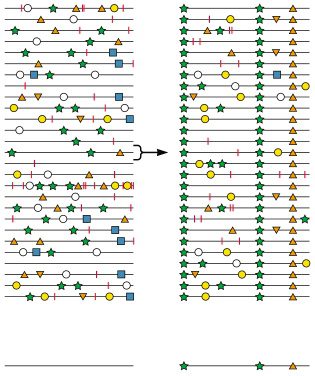

Viruses are excellent subjects for the study of evolution: they have short generation times, high yields of offspring, and prodigious levels of mutation, recombination, and reassortment. Furthermore, selection pressures can be readily applied in the laboratory, and may be often be identified in nature.
When studying evolution of viruses, it is important to avoid judging outcomes as ‘good’ or ‘bad’. Anthropormorphic assessments of virus evolution come naturally to humans, but concluding that viruses become ‘better adapted’ to their hosts, for example, fails to recognize the main goal of evolution: survival. Or, in the case of the non-living viruses, existence.
Evolution does not move a viral genome from simple to complex, or along a trajectory aimed at perfection. Change comes about by eliminating those viruses that are not well adapted for the current conditions, not by building something that will fare better tomorrow.

It seems one can equate “Change comes about by eliminating those viruses that are not well adapted for the current condition” as effectively survival of the fittest – or in Darwinian terms natural selection.
Yes, you are correct – but the selection comes about because of the
current conditions, not from trying to make a better virus for the
future.
On Thu, Jun 11, 2009 at 10:09 PM,
Quite true, in fact, a trajectory of perfection cannot exist as viruses have a limited energy reservoir where they have to make the 'choice' of which life history trait(s) to cater to based on the selection pressure(s). With every gain there is a loss–tradeoffs make leaps in complexity difficult and attainment of perfection impossible.
and the way how to mutate is itself subject to evolution…
As a programmer you may try to optimize a mathematical entity through
small changes, using a “genetical algorithm”. You have several parameters
how to best perform these small changes and the task is to finetune these
for optimal evolution speed. I feel that the viruses are not optimal here yet
and that other ideas for changing genetical material and remembering and optimizing the
parameters, may lead to much “better” viruses, which will then out-evolve the old ones.
This may be done artificially…
Seems like this applies to homo-sapiens as well. Current conditions cause the selection 🙁
Seems like this applies to homo-sapiens as well. Current conditions cause the selection 🙁
Pingback: Nature just is
Pingback: 6. Thomas Kuhn – Losing my Saganity